- Home
- Alfred Bester
Virtual Unrealities: The Short Fiction of Alfred Bester Page 4
Virtual Unrealities: The Short Fiction of Alfred Bester Read online
Page 4
“Don’t know how?” Ben tucked the football under his arm and dragged Oddy with him. “Where you been, laddie?”
“They didn’t think much of football back home,” Oddy grinned. “Said it was old-fashioned. We were strictly Huxley-Hob.”
“Huxley-Hob! That’s for eggheads,” Ben said. “Football is still the big game. You want to be famous? You got to be on that gridiron on TV every Saturday.”
“So I’ve noticed, Ben. Show me.”
Ben showed Oddy, carefully and with patience. Oddy took the lesson seriously and industriously. His third punt was caught by a freakish gust of wind, traveled seventy yards through the air, and burst through the third-floor window of Proctor Charley (Gravy-Train) Stuart. Stuart took one look at the window and had Oddy down to Soldier Stadium in half an hour. Three Saturdays later, the headlines read: Oddy Gaul 57–Army 0.
“Snell and Rumination!” Coach Hig Clayton swore. “How does he do it? There’s nothing sensational about that kid. He’s just average. But when he runs, they fall down, chasing him. When he kicks, they fumble. When they fumble, he recovers.”
“He’s a negative player,” Gravy-Train answered. “He lets you make the mistakes, and then he cashes in.”
They were both wrong. Oddy Gaul was a monster.
With his choice of any eligible young woman, Oddy Gaul went stag to the Observatory Prom, wandered into a darkroom by mistake, and discovered a girl in a smock bending over trays in the hideous green safe-light. She had cropped black hair, icy blue eyes, strong features, and a sensuous, boyish figure. She ordered him out and Oddy fell in love with her … temporarily.
His friends howled with laughter when he told them. “Shades of Pygmalion, Oddy, don’t you know about her? The girl is frigid. A statue. She loathes men. You’re wasting your time.”
But through the adroitness of her analyst, the girl turned a neurotic corner one week later and fell deeply in love with Oddy Gaul. It was sudden, devastating, and enraptured for two months. Then just as Oddy began to cool, the girl had a relapse and everything ended on a friendly, convenient basis.
So far only minor events made up the response to Oddy’s luck, but the shock wave of reaction was spreading. In September of his sophomore year, Oddy competed for the Political Economy Medal with a thesis entitled: “Causes of Mutiny.” The striking similarity of his paper to the Astraean mutiny that broke out the day his paper was entered won him the prize.
In October, Oddy contributed twenty dollars to a pool organized by a crackpot classmate for speculating on the Exchange according to “Stock Market Trends,” an ancient superstition. The prophet’s calculations were ridiculous, but a sharp panic nearly ruined the Exchange as it quadrupled the pool. Oddy made one hundred dollars.
And so it went … worse and worse. The monster.
Now, a monster can get away with a lot when he’s studying a speculative philosophy where causation is rooted in history and the Present is devoted to statistical analysis of the Past; but the living sciences are bulldogs with their teeth clamped on the phenomena of Now. So it was Jesse Migg, physiologist and spectral physicist, who first trapped the monster … and he thought he’d found an angel.
Old Jess was one of the Sights. In the first place he was young … not over forty. He was a malignant knife of a man, an albino, pink-eyed, bald, pointed-nose, and brilliant. He affected twentieth-century clothes and twentieth-century vices … tobacco and potations of C2H5OH. He never talked … He spat. He never walked … He scurried. And he was scurrying up and down the aisles of the laboratory of Tech I (General Survey of Spatial Mechanics—Required for All General Arts Students) when he ferreted out the monster.
One of the first experiments in the course was EMF Electrolysis. Elementary stuff. A U-Tube containing water was passed between the poles of a stock Remosant Magnet. After sufficient voltage was transmitted through the coils, you drew off hydrogen and oxygen in two-to-one ratio at the arms of the tube and related them to the voltage and the magnetic field.
Oddy ran his experiment earnestly, got the approved results, entered them in his lab book and then waited for the official checkoff. Little Migg came hustling down the aisle, darted to Oddy and spat: “Finished?”
“Yes, sir.”
Migg checked the book entries, glanced at the indicators at the ends of the tube, and stamped Oddy out with a sneer. It was only after Oddy was gone that he noticed the Remosant Magnet was obviously shorted. The wires were fused. There hadn’t been any field to electrolyze the water.
“Hell and Damnation!” Migg grunted (he also affected twentieth-century vituperation) and rolled a clumsy cigarette.
He checked off possibilities in his comptometer head. 1. Gaul cheated. 2. If so, with what apparatus did he portion out the H2 and O2? 3. Where did he get the pure gases? 4. Why did he do it? Honesty was easier. 5. He didn’t cheat. 6. How did he get the right results? 7. How did he get any results?
Old Jess emptied the U-Tube, refilled it with water, and ran off the experiment himself. He, too, got the correct result without a magnet.
“Christ on a raft!” he swore, unimpressed by the miracle, and infuriated by the mystery. He snooped, darting about like a hungry bat. After four hours he discovered that the steel bench supports were picking up a charge from the Greeson Coils in the basement and had thrown just enough field to make everything come out right.
“Coincidence,” Migg spat. But he was not convinced.
Two weeks later, in Elementary Fission Analysis, Oddy completed his afternoon’s work with a careful listing of resultant isotopes from selenium to lanthanum. The only trouble, Migg discovered, was that there had been a mistake in the stock issued to Oddy. He hadn’t received any U235 for neutron bombardment. His sample had been a leftover from a Stefan-Boltzmann black-body demonstration.
“God in Heaven!” Migg swore, and double-checked. Then he triple-checked. When he found the answer—a remarkable coincidence involving improperly cleaned apparatus and a defective cloud-chamber—he swore further. He also did some intensive thinking.
“There are accident-prones,” Migg snarled at the reflection in his Self-Analysis Mirror. “How about good-luck prones? Horse manure!”
But he was a bulldog with his teeth sunk in phenomena. He tested Oddy Gaul. He hovered over him in the laboratory, cackling with infuriated glee as Oddy completed experiment after experiment with defective equipment. When Oddy successfully completed the Rutherford Classic—getting 8O17 after exposing nitrogen to alpha radiation, but in this case without the use of nitrogen or alpha radiation—Migg actually clapped him on the back in delight. Then the little man investigated and found the logical, improbable chain of coincidences that explained it.
He devoted his spare time to a check-back on Oddy’s career at Harvard. He had a two-hour conference with a lady astronomer’s faculty analyst, and a ten-minute talk with Hig Clayton and Gravy-Train Stuart. He rooted out the Exchange Pool, the Political Economy Medal, and half a dozen other incidents that filled him with malignant joy. Then he cast off his twentieth-century affectation, dressed himself properly in formal leotards, and entered the Faculty Club for the first time in a year.
A four-handed chess game on a transparent toroid board was in progress in the Diathermy Alcove. It had been in progress since Migg joined the faculty, and would probably not be finished before the end of the century. In fact, Johansen, playing Red, was already training his son to replace him in the likely event of his dying before the completion of the game.
As abrupt as ever, Migg marched up to the glowing board, sparkling with varicolored pieces, and blurted: “What do you know about accidents?”
“Ah?” said Bellanby, Philosopher in Res at the University. “Good evening, Migg. Do you mean the accident of substance, or the accident of essence? If, on the other hand, your question implies—”
“No, no,” Migg interrupted. “My apologies, Bellanby. Let me rephrase the question. Is there such a thing as Compulsion of Probability?”
/>
Hrrdnikkisch completed his move and gave full attention to Migg, as did Johansen and Bellanby. Wilson continued to study the board. Since he was permitted one hour to make his move and would need it, Migg knew there would be ample time for the discussion.
“Compulthon of Probability?” Hrrdnikkisch lisped. “Not a new conthept, Migg. I recall a thurvey of the theme in ‘The Integraph’ Vol. LVIII, No. 9. The calculuth, if I am not mithtaken—”
“No,” Migg interrupted again. “My respects, Signoid. I’m not interested in the mathematics of probability, nor the philosophy. Let me put it this way. The accident-prone has already been incorporated into the body of psychoanalysis. Paton’s Theorem of the Least Neurotic Norm settled that. But I’ve discovered the obverse. I’ve discovered a Fortune-Prone.”
“Ah?” Johansen chuckled. “It’s to be a joke. You wait and see, Signoid.”
“No,” answered Migg. “I’m perfectly serious. I’ve discovered a genuinely lucky man.”
“He wins at cards?”
“He wins at everything. Accept this postulate for the moment… . I’ll document it later… . There is a man who is lucky. He is a Fortune-Prone. Whatever he desires, he receives. Whether he has the ability to achieve it or not, he receives it. If his desire is totally beyond the peak of his accomplishment, then the factors of chance, coincidence, hazard, accident … and so on, combine to produce his desired end.”
“No.” Bellanby shook his head. “Too farfetched.”
“I’ve worked it out empirically,” Migg continued. “It’s something like this. The future is a choice of mutually exclusively possibilities, one or another of which must be realized in terms of favorability of the events and number of the events… .”
“Yes, yes,” interrupted Johansen. “The greater the number of favorable possibilities, the stronger the probability of an event maturing. This is elementary, Migg. Go on.”
“I continue,” Migg spat indignantly. “When we discuss probability in terms of throwing dice, the predictions or odds are simple. There are only six mutually exclusive possibilities to each die. The favorability is easy to compute. Chance is reduced to simple odds-ratios. But when we discuss probability in terms of the Universe, we cannot encompass enough data to make a prediction. There are too many factors. Favorability cannot be ascertained.”
“All thith ith true,” Hrrdnikkisch said, “but what of your Fortune-Prone?”
“I don’t know how he does it … but merely by the intensity or mere existence of his desire, he can affect the favorability of possibilities. By wanting, he can turn possibility into probability, and probability into certainty.”
“Ridiculous,” Bellanby snapped. “You claim there’s a man far-sighted and far-reaching enough to do this?”
“Nothing of the sort. He doesn’t know what he’s doing. He just thinks he’s lucky, if he thinks about it at all. Let us say he wants … Oh … Name anything.”
“Heroin,” Bellanby said.
“What’s that?” Johansen inquired.
“A morphine derivative,” Hrrdnikkisch explained. “Formerly manufactured and thold to narcotic addictth.”
“Heroin,” Migg said. “Excellent. Say my man desires heroin, an antique narcotic no longer in existence. Very good. His desire would compel this sequence of possible but improbable events: A chemist in Australia, fumbling through a new organic synthesis, will accidentally and unwittingly prepare six ounces of heroin. Four ounces will be discarded, but through a logical mistake two ounces will be preserved. A further coincidence will ship it to this country and this city, wrapped as powdered sugar in a plastic ball; where the final accident will serve it to my man in a restaurant which he is visiting for the first time on an impulse… .”
“La-La-La!” said Hrrdnikkisch. “Thith shuffling of hithtory. Thith fluctuation of inthident and pothibility? All achieved without the knowledge but with the dethire of a man?”
“Yes. Precisely my point,” Migg snarled. “I don’t know how he does it, but he turns possibility into certainty. And since almost anything is possible, he is capable of accomplishing almost anything. He is godlike but not a god, because he does this without consciousness. He is an angel.”
“Who is this angel?” Johansen asked.
And Migg told them all about Oddy Gaul.
“But how does he do it?” Bellanby persisted. “How does he do it?”
“I don’t know,” Migg repeated again. “Tell me how Espers do it.”
“What!” Bellanby exclaimed. “Are you prepared to deny the telepathic pattern of thought? Do you—”
“I do nothing of the sort. I merely illustrate one possible explanation. Man produces events. The threatening War of Resources may be thought to be a result of the natural exhaustion of Terran resources. We know it is not. It is a result of centuries of thriftless waste by man. Natural phenomena are less often produced by nature and more often produced by man.”
“And?”
“Who knows? Gaul is producing phenomena. Perhaps he’s unconsciously broadcasting on a telepathic wave band. Broadcasting and getting results. He wants heroin. The broadcast goes out—”
“But Espers can’t pick up any telepathic pattern further than the horizon. It’s direct wave transmission. Even large objects cannot be penetrated. A building, say, or a—”
“I’m not saying this is on the Esper level,” Migg shouted. “I’m trying to imagine something bigger. Something tremendous. He wants heroin. His broadcast goes out to the world. All men unconsciously fall into a pattern of activity which will produce that heroin as quickly as possible. That Austrian chemist—”
“No. Australian.”
“That Australian chemist may have been debating between half a dozen different syntheses. Five of them could never have produced heroin; but Gaul’s impulse made him select the sixth.”
“And if he did not anyway?”
“Then who knows what parallel chains were also started? A boy playing Robin Hood in Montreal is impelled to explore an abandoned cabin where he finds the drug, hidden there centuries ago by smugglers. A woman in California collects old apothecary jars. She finds a pound of heroin. A child in Berlin, playing with a defective Radar-Chem Set, manufactures it. Name the most improbable sequence of events, and Gaul can bring it about, logically and certainly. I tell you, that boy is an angel!”
And he produced his documented evidence and convinced them.
It was then that four scholars of various but indisputable intellects elected themselves an executive committee for Fate and took Oddy Gaul in hand. To understand what they attempted to do, you must first understand the situation the world found itself in during that particular era.
It is a known fact that all wars are founded in economic conflict, or to put it another way, a trial by arms is merely the last battle of an economic war. In the pre-Christian centuries, the Punic Wars were the final outcome of a financial struggle between Rome and Carthage for economic control of the Mediterranean. Three thousand years later, the impending War of Resources loomed as the finale of a struggle between the two Independent Welfare States controlling most of the known economic world.
What petroleum oil was to the twentieth century, FO (the nickname for Fissionable Ore) was to the thirtieth; and the situation was peculiarly similar to the Asia Minor crisis that ultimately wrecked the United Nations a thousand years before. Triton, a backward semibar-baric satellite, previously unwanted and ignored, had suddenly discovered it possessed enormous resources of FO. Financially and technologically incapable of self-development, Triton was peddling concessions to both Welfare States.
The difference between a Welfare State and a Benevolent Despot is slight. In times of crisis, either can be traduced by the sincerest motives into the most abominable conduct. Both the Comity of Nations (bitterly nicknamed “The Con Men” by Der Realpolitik aus Terra) and Der Realpolitik aus Terra (sardonically called “The Rats” by the Comity of Nations) were desperately in need of natural resource
s, meaning FO. They were bidding against each other hysterically, and elbowing each other with sharp skirmishes at outposts. Their sole concern was the protection of their citizens. From the best of motives they were preparing to cut each other’s throat.
Had this been the issue before the citizens of both Welfare States, some compromise might have been reached; but Triton, intoxicated as a schoolboy with a newfound prominence and power, confused issues by raising a religious issue and reviving a Holy War which the Family of Planets had long forgotten. Assistance in their Holy War (involving the extermination of a harmless and rather unimportant sect called the Quakers) was one of the conditions of sale. This, both the Comity of Nations and Der Realpolitik aus Terra were prepared to swallow with or without private reservations, but it could not be admitted to their citizens.
And so, camouflaged by the burning issues of Rights of Minority Sects, Priority of Pioneering, Freedom of Religion, Historical Rights to Triton v. Possession of Fact, etc., the two Houses of the Family of Planets feinted, parried, riposted, and slowly closed, like fencers on the strip, for the final sortie which meant ruin for both.
All this the four men discussed through three interminable meetings.
“Look here,” Migg complained toward the close of the third consultation. “You theoreticians have already turned nine man-hours into carbonic acid with ridiculous dissensions …”
Bellanby nodded, smiling. “It’s as I’ve always said, Migg. Every man nurses the secret belief that were he God he could do the job much better. We’re just learning how difficult it is.”
“Not God,” Hrrdnikkisch said, “but hith Prime Minithterth. Gaul will be God.”
Johansen winced. “I don’t like that talk,” he said. “I happen to be a religious man.”
“You?” Bellanby exclaimed in surprise. “A Colloid-Therapeutist?”
“I happen to be a religious man,” Johansen repeated stubbornly.
“But the boy hath the power of the miracle,” Hrrdnikkisch protested. “When he hath been taught to know what he doth, he will be a God.”

 Galatea Galante
Galatea Galante Hobson’s Choice
Hobson’s Choice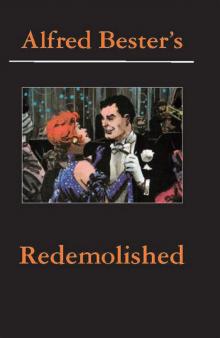 Redemolished
Redemolished The Flowered Thundermug
The Flowered Thundermug The Starcomber
The Starcomber Virtual Unrealities: The Short Fiction of Alfred Bester
Virtual Unrealities: The Short Fiction of Alfred Bester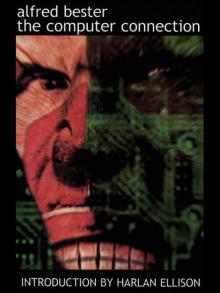 The Computer Connection
The Computer Connection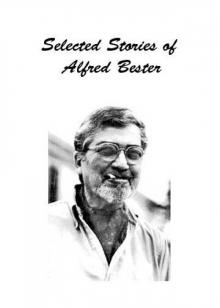 Selected Stories of Alfred Bester
Selected Stories of Alfred Bester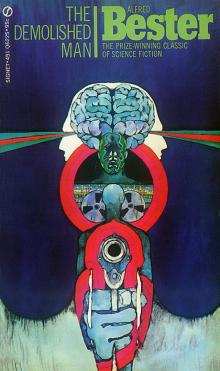 The Demolished Man
The Demolished Man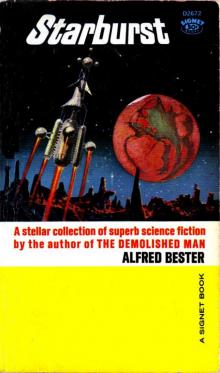 Starburst
Starburst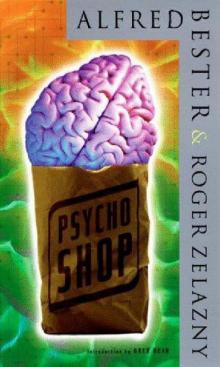 Psychoshop
Psychoshop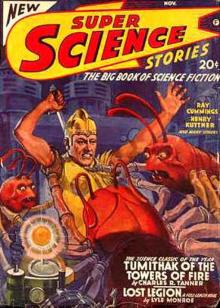 Biped Reegan
Biped Reegan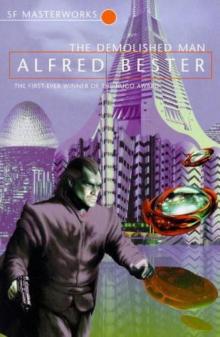 Demolished Man
Demolished Man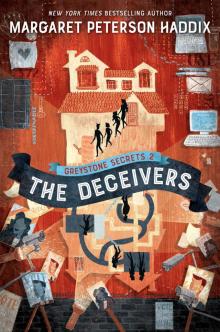 THE DECEIVERS
THE DECEIVERS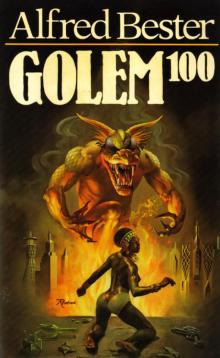 GOLEM 100
GOLEM 100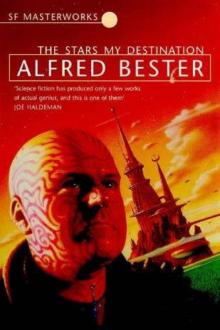 The Stars My Destination
The Stars My Destination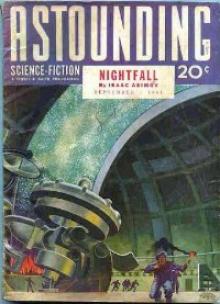 Adam And No Eve
Adam And No Eve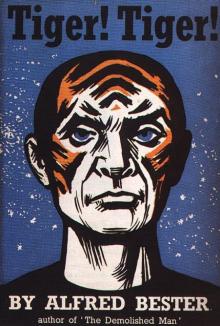 The Stars My Destination ( Tiger! Tiger! )
The Stars My Destination ( Tiger! Tiger! )